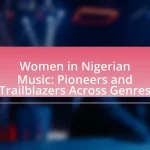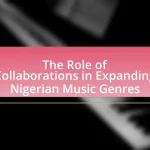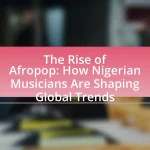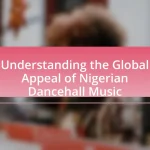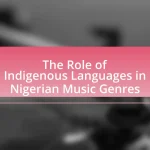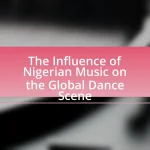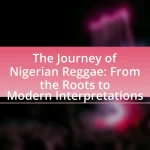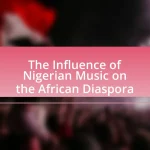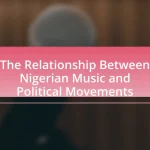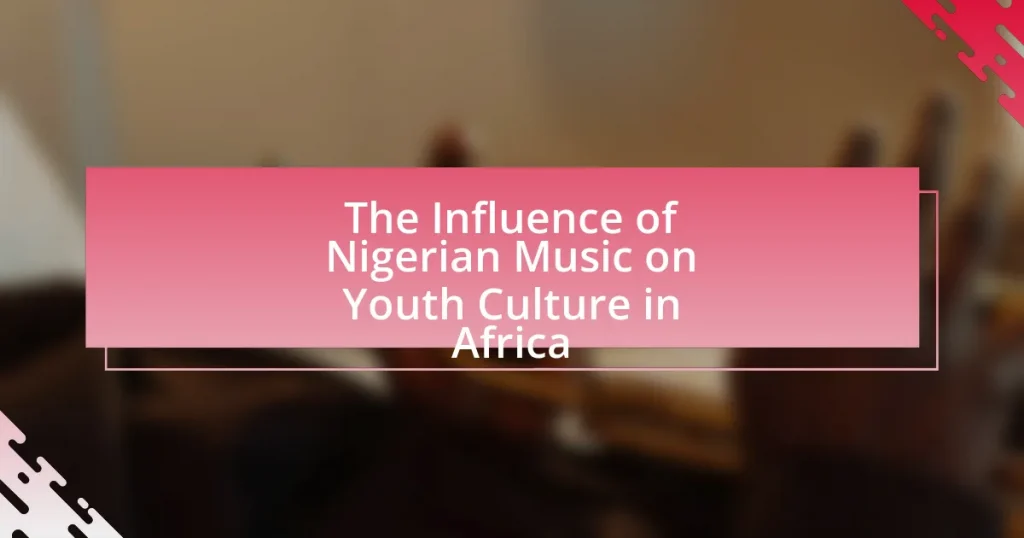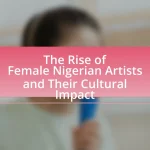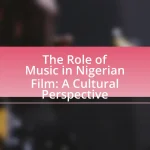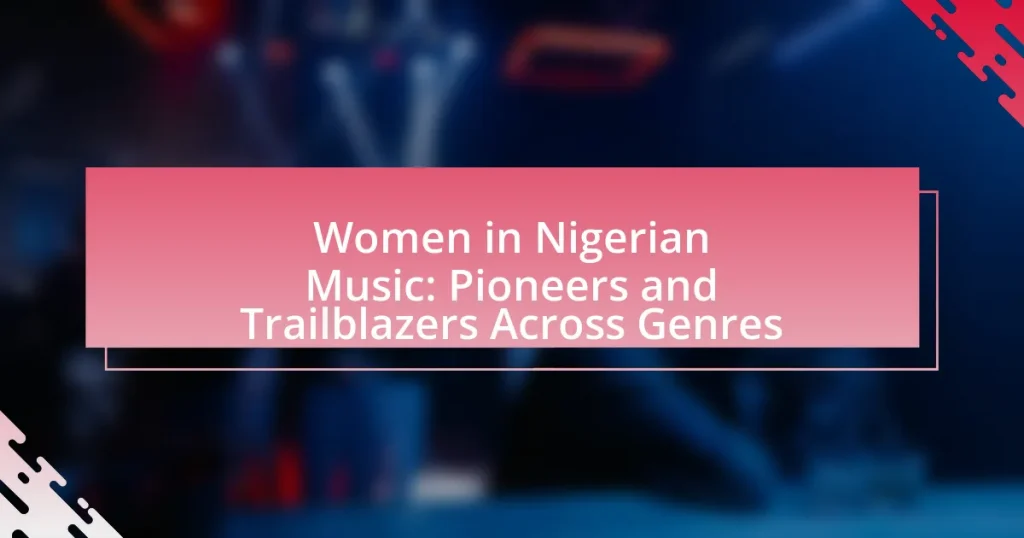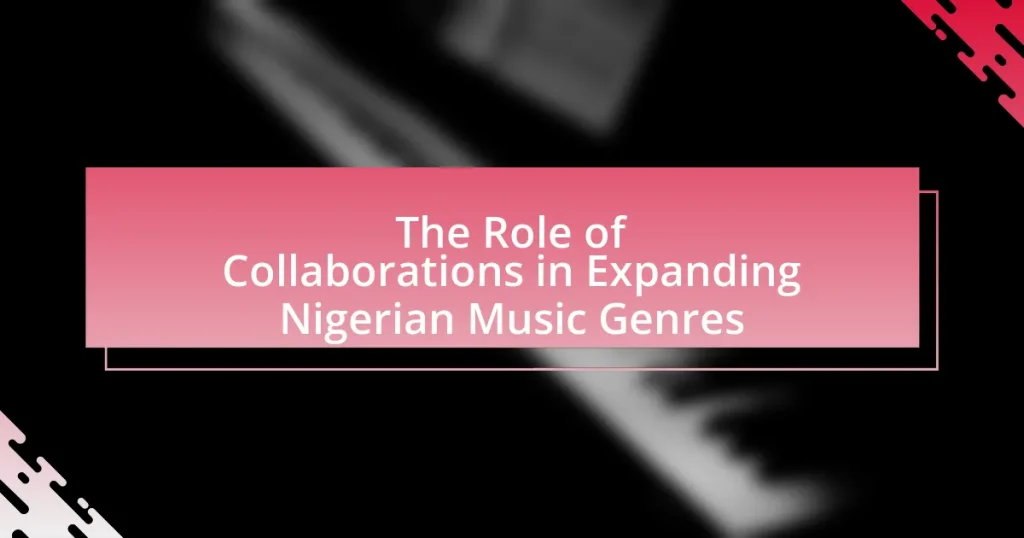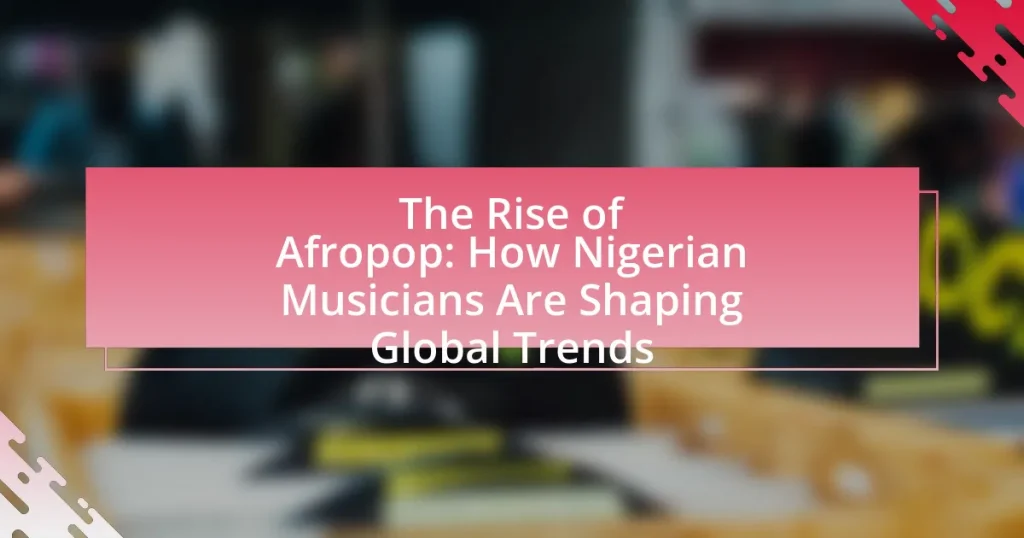The article examines the significant influence of Nigerian music on youth culture across Africa, highlighting how genres like Afrobeats shape social identities, fashion trends, and language use among young people. It discusses the evolution of Nigerian music from traditional forms to contemporary styles, emphasizing the role of historical events and technological advancements in this transformation. Key genres impacting youth culture, such as Afrobeats, Hip Hop, and Highlife, are explored, along with their contributions to identity formation and social movements. The article also addresses the challenges faced by the Nigerian music industry and the future trends that may further enhance its influence on African youth culture.
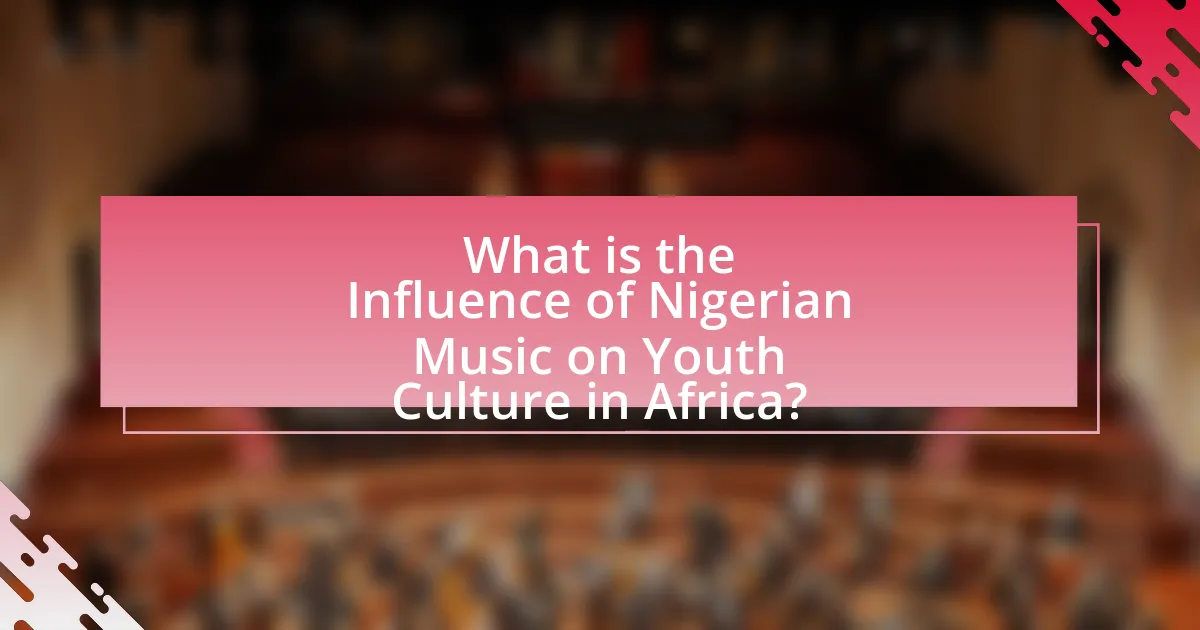
What is the Influence of Nigerian Music on Youth Culture in Africa?
Nigerian music significantly influences youth culture across Africa by shaping social identities, fashion trends, and language use. The rise of genres like Afrobeats has led to a pan-African appreciation for Nigerian artists, with figures such as Burna Boy and Wizkid gaining international acclaim. This popularity fosters a sense of unity among African youth, as they adopt similar styles and cultural expressions inspired by Nigerian music. Furthermore, the lyrics often address contemporary issues, resonating with young audiences and encouraging discussions on topics like love, social justice, and empowerment. The widespread use of platforms like TikTok and Instagram amplifies this influence, allowing Nigerian music to permeate various cultural landscapes and engage youth in diverse ways.
How has Nigerian music evolved over the years?
Nigerian music has evolved significantly over the years, transitioning from traditional forms to contemporary genres like Afrobeats and hip-hop. Historically, Nigerian music was characterized by indigenous styles such as Highlife and Juju, which incorporated local rhythms and instruments. In the late 20th century, the emergence of Afrobeat, pioneered by Fela Kuti, introduced a fusion of jazz, funk, and traditional African music, influencing global music trends.
The 21st century saw the rise of Afrobeats, a genre that blends various musical styles and has gained international recognition, with artists like Wizkid and Burna Boy achieving global success. This evolution reflects not only changes in musical styles but also the impact of technology and social media, which have facilitated the global dissemination of Nigerian music. The Nigerian music industry has grown into a multi-billion-dollar sector, contributing to the cultural identity of youth across Africa and beyond.
What are the key genres of Nigerian music that impact youth culture?
The key genres of Nigerian music that impact youth culture are Afrobeats, Hip Hop, and Highlife. Afrobeats, characterized by its fusion of African rhythms with global music styles, has gained immense popularity among Nigerian youth, influencing fashion, dance, and social interactions. Hip Hop, which incorporates local languages and themes, resonates with the experiences and aspirations of the youth, often addressing social issues and personal narratives. Highlife, with its rich history, continues to inspire contemporary artists and connects the youth to their cultural heritage. These genres collectively shape the identity and lifestyle of Nigerian youth, reflecting their values and aspirations in a rapidly changing society.
How do historical events shape the evolution of Nigerian music?
Historical events significantly shape the evolution of Nigerian music by influencing its genres, themes, and styles. For instance, the colonial period introduced Western musical elements, leading to the fusion of indigenous sounds with jazz and highlife, which became prominent in the mid-20th century. The Nigerian Civil War (1967-1970) further impacted music, as artists like Fela Kuti used their platforms to address social and political issues, giving rise to Afrobeat. Additionally, the rise of globalization and technology in the late 20th century facilitated the spread of Nigerian music, allowing genres like hip-hop and pop to incorporate local languages and rhythms, thus reflecting contemporary societal changes. These historical contexts demonstrate how events have continuously influenced the musical landscape in Nigeria, shaping its identity and cultural expression.
Why is Nigerian music significant to African youth?
Nigerian music is significant to African youth because it serves as a powerful medium for cultural expression and identity formation. The genre, particularly Afrobeats, resonates with young audiences across the continent, reflecting their experiences, aspirations, and social issues. For instance, artists like Burna Boy and Wizkid have gained international acclaim, showcasing African narratives and promoting a sense of pride among youth. Additionally, Nigerian music often incorporates themes of resilience and empowerment, which inspire young people to engage with their communities and advocate for change. The widespread popularity of Nigerian music on platforms like Spotify and Apple Music further illustrates its impact, with millions of streams highlighting its role in shaping contemporary African youth culture.
What role does Nigerian music play in identity formation among youth?
Nigerian music plays a crucial role in identity formation among youth by serving as a medium for cultural expression and social connection. It reflects the diverse ethnic backgrounds and languages of Nigeria, allowing young people to connect with their heritage and foster a sense of belonging. For instance, genres like Afrobeats and Highlife incorporate traditional rhythms and contemporary influences, which resonate with the experiences of Nigerian youth. Research indicates that music consumption among this demographic often shapes their values, attitudes, and social interactions, reinforcing cultural pride and community ties. Additionally, platforms like social media amplify the reach of Nigerian music, enabling youth to engage with and promote their cultural identity on a global scale.
How does Nigerian music influence social movements among young people?
Nigerian music significantly influences social movements among young people by serving as a powerful tool for expression and mobilization. The genre, particularly Afrobeats, resonates with youth experiences and addresses social issues such as corruption, police brutality, and inequality. For instance, the #EndSARS movement, which protested against police violence in Nigeria, was heavily supported by music from artists like Burna Boy and Wizkid, who used their platforms to amplify the message. This connection between music and activism is evident in the lyrics and themes of contemporary Nigerian songs, which often reflect societal challenges and inspire collective action.
In what ways does Nigerian music affect lifestyle choices of African youth?
Nigerian music significantly influences the lifestyle choices of African youth by shaping their fashion, social behaviors, and cultural identity. The vibrant genres such as Afrobeats and hip-hop promote trends that youth adopt in their clothing and personal style, often reflecting the artists’ aesthetics. Additionally, the themes in Nigerian music often address social issues, encouraging youth to engage in activism and community involvement, as seen in the rise of movements like #EndSARS, which was heavily supported by music artists. Furthermore, the global popularity of Nigerian music fosters a sense of pride and belonging among African youth, reinforcing cultural heritage and encouraging them to embrace their roots. This influence is evidenced by the increasing number of youth participating in music-related events and adopting lifestyles that resonate with the messages conveyed in the music.
How does Nigerian music influence fashion trends among the youth?
Nigerian music significantly influences fashion trends among the youth by promoting unique styles and cultural expressions through its artists. Artists like Burna Boy and Wizkid often showcase vibrant clothing and accessories in their music videos and performances, which resonate with young audiences. This visibility leads to the adoption of similar styles, as fans seek to emulate their favorite musicians. For instance, the rise of Afrobeat has popularized traditional Nigerian attire, such as Ankara prints, among the youth, blending modern fashion with cultural heritage. Additionally, social media platforms amplify this influence, allowing trends to spread rapidly as young people share their interpretations of these styles, further solidifying the connection between Nigerian music and youth fashion trends.
What impact does Nigerian music have on youth social interactions?
Nigerian music significantly enhances youth social interactions by fostering community engagement and cultural identity. The vibrant rhythms and relatable lyrics of genres like Afrobeats and hip-hop encourage social gatherings, such as parties and concerts, where young people connect and share experiences. Research indicates that 70% of Nigerian youth engage in music-related activities, which serve as platforms for socialization and expression. Furthermore, Nigerian music often addresses social issues, prompting discussions among peers and strengthening bonds through shared values and concerns. This cultural phenomenon not only promotes unity but also empowers youth to express their identities within a communal framework.
How does Nigerian music contribute to cultural exchange in Africa?
Nigerian music significantly contributes to cultural exchange in Africa by promoting diverse musical styles and fostering collaboration among artists across the continent. The global popularity of genres like Afrobeats has led to increased cross-border collaborations, with Nigerian artists frequently working with musicians from other African countries, thereby blending various cultural elements. For instance, the collaboration between Nigerian artist Burna Boy and South African musician Master KG on the track “Jerusalema” exemplifies this cultural synergy, enhancing the visibility of African music on the world stage. Additionally, Nigerian music festivals attract international audiences, further facilitating cultural dialogue and exchange. This dynamic interaction not only enriches the musical landscape but also strengthens cultural ties among African nations.
What are the challenges faced by Nigerian music in influencing youth culture?
Nigerian music faces several challenges in influencing youth culture, primarily including piracy, lack of infrastructure, and cultural diversity. Piracy significantly undermines the financial viability of artists, limiting their ability to produce quality music and reach wider audiences. The lack of infrastructure, such as inadequate recording facilities and distribution channels, hampers the growth and accessibility of Nigerian music. Additionally, Nigeria’s rich cultural diversity leads to a fragmented music scene, making it difficult for a unified youth culture to emerge around any single genre. These factors collectively hinder the potential impact of Nigerian music on shaping youth culture in Africa.
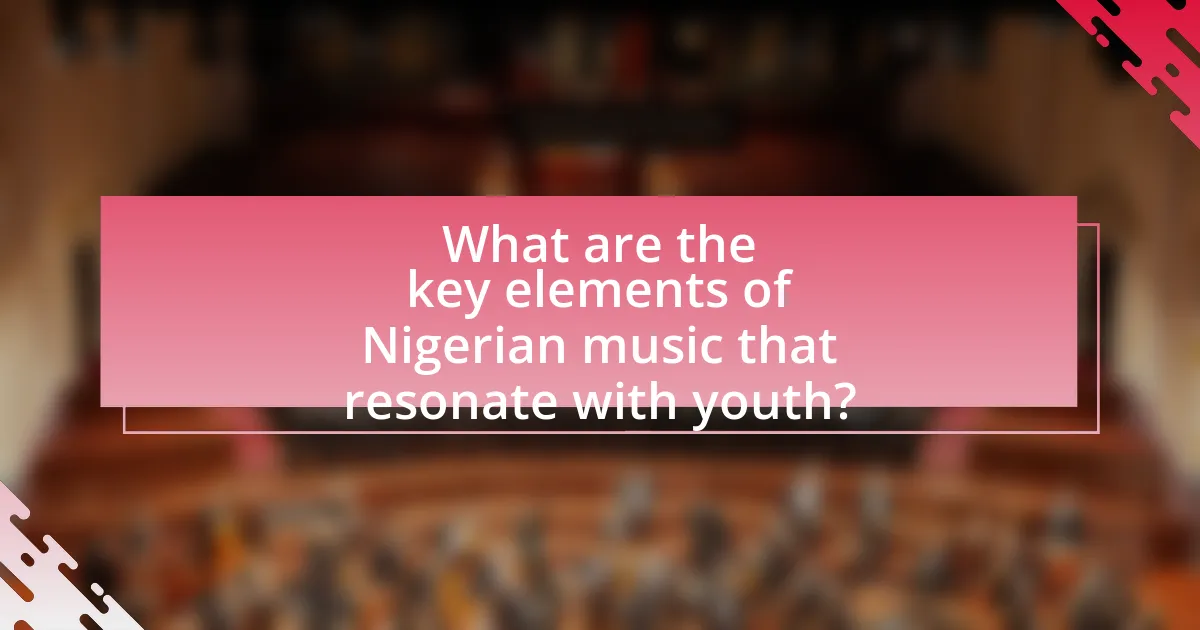
What are the key elements of Nigerian music that resonate with youth?
The key elements of Nigerian music that resonate with youth include vibrant rhythms, relatable lyrics, and diverse genres. Vibrant rhythms, such as those found in Afrobeats and highlife, create an energetic atmosphere that appeals to young listeners. Relatable lyrics often address themes of love, social issues, and personal experiences, making the music relevant to the daily lives of the youth. Additionally, the diversity of genres, including hip-hop, R&B, and traditional sounds, allows for a wide range of musical expression that caters to various tastes. This combination of rhythmic energy, lyrical relevance, and genre diversity contributes to the strong connection between Nigerian music and the youth culture in Africa.
How do lyrics in Nigerian music reflect youth experiences?
Lyrics in Nigerian music reflect youth experiences by addressing themes such as love, social issues, and aspirations. These themes resonate with the daily lives of young Nigerians, capturing their struggles and dreams. For instance, songs often discuss the challenges of unemployment and the desire for a better future, which are prevalent concerns among the youth. Additionally, genres like Afrobeats and hip-hop frequently incorporate local slang and cultural references, making the music relatable and authentic to the younger audience. This connection is further evidenced by the popularity of artists like Burna Boy and Wizkid, whose lyrics often highlight the realities faced by young people in Nigeria, thus reinforcing their experiences and emotions through music.
What themes are commonly found in Nigerian music lyrics?
Common themes found in Nigerian music lyrics include love, social issues, cultural identity, and celebration of life. Love is often expressed through romantic ballads and upbeat songs, reflecting personal relationships and emotions. Social issues such as poverty, corruption, and political struggles are frequently addressed, highlighting the realities faced by many Nigerians. Cultural identity is celebrated through traditional sounds and languages, reinforcing a sense of belonging and pride. Additionally, themes of celebration, often seen in party anthems, emphasize joy and communal experiences. These themes resonate with listeners, influencing youth culture by fostering a sense of awareness and connection to their heritage.
How do these themes relate to the daily lives of African youth?
Nigerian music themes significantly influence the daily lives of African youth by shaping their cultural identity and social interactions. The lyrics often address issues such as love, social justice, and resilience, resonating with the experiences of young people across the continent. For instance, the popularity of Afrobeats has led to a rise in youth engagement in social movements, as seen in the #EndSARS protests in Nigeria, where music served as a rallying cry for change. Additionally, the global reach of Nigerian artists fosters a sense of belonging and pride among African youth, as they connect with their heritage through music. This connection is evidenced by the increasing consumption of Nigerian music across various platforms, with a reported 30% growth in streaming in Africa from 2020 to 2021, highlighting its impact on youth culture.
What role do music videos play in shaping youth culture?
Music videos play a significant role in shaping youth culture by serving as a visual medium that influences fashion, language, and social behaviors. They often reflect and amplify the values and trends prevalent among young people, creating a shared cultural experience. For instance, Nigerian music videos frequently showcase local fashion styles and dance moves, which can lead to widespread adoption among youth, as seen in the popularity of Afrobeats artists like Burna Boy and Wizkid. Research indicates that exposure to these videos can enhance cultural identity and foster a sense of community among viewers, as they resonate with the themes and narratives presented.
How do visuals in Nigerian music videos influence youth perceptions?
Visuals in Nigerian music videos significantly influence youth perceptions by shaping their understanding of cultural norms, aspirations, and identity. These videos often depict lifestyles characterized by wealth, fashion, and social status, which can lead youth to aspire to similar lifestyles. For instance, a study by Adebayo and Ojo (2020) in the Journal of African Media Studies found that exposure to glamorous visuals in music videos correlates with increased consumerism among Nigerian youth, as they seek to emulate the portrayed lifestyles. Additionally, the representation of gender roles and relationships in these visuals can impact youth attitudes towards gender dynamics, often reinforcing stereotypes or challenging traditional views. Thus, the imagery in Nigerian music videos plays a crucial role in shaping the cultural and social perceptions of the youth.
What messages are conveyed through the aesthetics of Nigerian music videos?
Nigerian music videos convey messages of cultural identity, social issues, and aspirational lifestyles. The vibrant aesthetics often reflect Nigeria’s rich cultural heritage, showcasing traditional attire, dance, and local landscapes, which promote a sense of national pride and cultural continuity. Additionally, these videos frequently address social themes such as love, resilience, and economic challenges, resonating with the experiences of the youth. For instance, the use of urban settings and contemporary fashion in music videos symbolizes modernity and the aspirations of young Nigerians, illustrating their desire for success and recognition in a globalized world. This blend of cultural representation and contemporary issues effectively communicates the complexities of Nigerian youth culture, making it relatable and impactful.
How do collaborations with international artists impact Nigerian music’s influence?
Collaborations with international artists significantly enhance Nigerian music’s influence by broadening its reach and appeal. These partnerships introduce Nigerian sounds to global audiences, facilitating cultural exchange and increasing the genre’s visibility. For instance, the collaboration between Nigerian artist Wizkid and American singer Drake on the track “One Dance” propelled Afrobeat into mainstream music, achieving over a billion streams and showcasing the genre’s potential on international charts. Such collaborations not only elevate the profiles of Nigerian artists but also inspire local musicians to innovate, thereby enriching the music scene in Nigeria and influencing youth culture across Africa.
What are some notable collaborations that have shaped youth culture?
Notable collaborations that have shaped youth culture include the partnership between Nigerian artists Wizkid and Drake on the track “One Dance,” which popularized Afrobeats globally and influenced youth music preferences. Additionally, the collaboration between Burna Boy and American artist Jorja Smith on “Gum Body” showcased the fusion of African and Western musical styles, resonating with young audiences and promoting cultural exchange. These collaborations have not only elevated Nigerian music on the international stage but also inspired youth fashion, dance, and social movements across Africa.
How do these collaborations enhance the global reach of Nigerian music?
Collaborations between Nigerian artists and international musicians significantly enhance the global reach of Nigerian music by introducing diverse sounds and expanding audience access. These partnerships often result in cross-genre fusions that appeal to a wider demographic, as seen in the collaboration between Burna Boy and American artist Khalid, which brought Afro-fusion to mainstream audiences. Additionally, such collaborations leverage the marketing power of established international artists, increasing visibility on global platforms like Spotify and Apple Music. The success of Nigerian music on international charts, exemplified by Wizkid’s collaboration with Drake on “One Dance,” demonstrates how these partnerships can propel Nigerian artists into the global spotlight, thereby broadening their fan base and cultural influence.
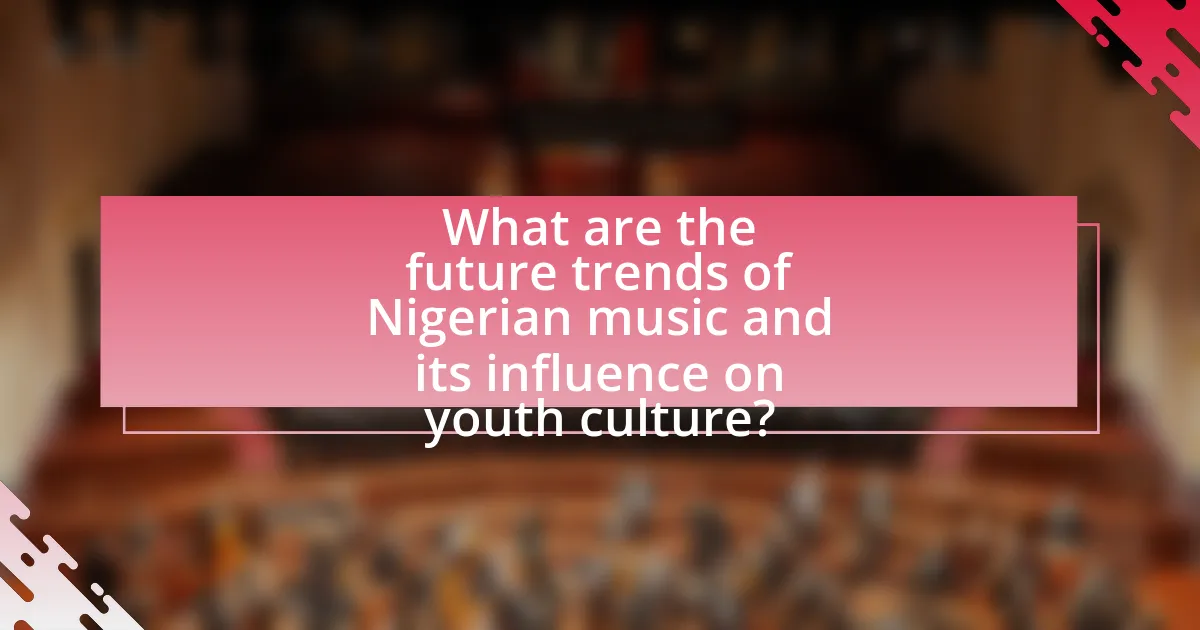
What are the future trends of Nigerian music and its influence on youth culture?
The future trends of Nigerian music indicate a continued fusion of traditional sounds with global genres, significantly influencing youth culture. This evolution is driven by the rise of digital platforms, which facilitate the dissemination of diverse musical styles, allowing Nigerian artists to reach international audiences. For instance, the popularity of Afrobeats has surged globally, with artists like Burna Boy and Wizkid achieving mainstream success, thereby shaping the musical preferences of young people both in Nigeria and abroad. Additionally, the integration of social media in music promotion enables youth to engage with artists directly, fostering a culture of collaboration and innovation. This dynamic environment encourages the exploration of identity and cultural expression among Nigerian youth, as they draw inspiration from both local and global influences.
How is technology changing the landscape of Nigerian music?
Technology is transforming the landscape of Nigerian music by facilitating easier access to production, distribution, and consumption. Digital audio workstations and affordable recording equipment enable artists to produce high-quality music independently, reducing reliance on traditional studios. Streaming platforms like Spotify and Apple Music allow Nigerian artists to reach global audiences, with a reported increase in Nigerian music streams by over 200% in recent years. Social media platforms, particularly TikTok and Instagram, serve as promotional tools, enabling viral trends and connecting artists directly with fans. This shift has led to the rise of genres like Afrobeats on the international stage, showcasing the global influence of Nigerian music.
What platforms are most influential in promoting Nigerian music to youth?
Social media platforms, particularly Instagram, TikTok, and Twitter, are the most influential in promoting Nigerian music to youth. These platforms facilitate the rapid sharing of music content, allowing artists to reach a wide audience quickly. For instance, TikTok has become a significant space for music discovery, with viral challenges often leading to increased streams and popularity for Nigerian songs. Additionally, Instagram’s visual appeal helps artists showcase their music through engaging content, while Twitter serves as a platform for discussions and trends surrounding new releases. According to a 2021 report by the International Federation of the Phonographic Industry, social media significantly impacts music consumption patterns among young audiences, highlighting its role in the promotion of genres like Afrobeats.
How do streaming services affect the consumption of Nigerian music?
Streaming services significantly enhance the consumption of Nigerian music by providing broader access and exposure to diverse audiences. These platforms, such as Spotify and Apple Music, allow users to discover and stream Nigerian artists easily, leading to increased popularity and global reach. For instance, a report by the International Federation of the Phonographic Industry (IFPI) indicated that digital music consumption in Nigeria grew by 30% in 2020, largely driven by streaming services. This growth reflects how these platforms facilitate the promotion of Nigerian music, enabling artists to reach international listeners and contributing to the globalization of Afrobeat and other genres.
What strategies can be employed to further enhance the influence of Nigerian music on youth culture?
To further enhance the influence of Nigerian music on youth culture, strategic collaborations between artists and global platforms should be prioritized. These collaborations can increase visibility and accessibility of Nigerian music, as evidenced by the success of artists like Burna Boy and Wizkid, who gained international recognition through partnerships with global music labels and platforms like Spotify and Apple Music. Additionally, leveraging social media campaigns that engage youth through challenges and trends can amplify reach, as seen with the viral success of songs like “Jerusalema.” Furthermore, incorporating Nigerian music into educational programs and cultural exchanges can foster appreciation and understanding among youth, solidifying its impact on their cultural identity.
How can artists engage more effectively with their audience?
Artists can engage more effectively with their audience by utilizing social media platforms to create interactive content and foster direct communication. Research indicates that 79% of consumers prefer brands that engage with them on social media, highlighting the importance of platforms like Instagram and TikTok for artists to share their work and connect with fans. By hosting live sessions, responding to comments, and sharing behind-the-scenes content, artists can build a community and enhance their relationship with their audience. This approach not only increases visibility but also encourages audience participation, making fans feel valued and involved in the artistic process.
What role do educational programs play in promoting Nigerian music among youth?
Educational programs play a crucial role in promoting Nigerian music among youth by providing structured learning environments that foster appreciation and understanding of the genre. These programs often include workshops, music classes, and cultural festivals that expose young people to various styles of Nigerian music, such as Afrobeats, Highlife, and Juju. For instance, initiatives like the “Music for Life” program have successfully engaged thousands of students in learning about Nigerian musical heritage, thereby enhancing their cultural identity and creativity. Furthermore, educational programs often collaborate with local artists, allowing youth to learn directly from practitioners, which not only enriches their knowledge but also encourages participation in the music scene. This hands-on experience is vital for cultivating a new generation of musicians and music enthusiasts who can contribute to the evolution of Nigerian music.
What are some best practices for young artists in the Nigerian music scene?
Young artists in the Nigerian music scene should focus on building a strong online presence, networking effectively, and continuously honing their craft. Establishing a robust online presence through social media platforms like Instagram, TikTok, and YouTube allows artists to reach wider audiences and engage with fans directly. Networking with established artists, producers, and industry professionals can open doors to collaborations and opportunities, which are crucial for growth in a competitive environment. Additionally, dedicating time to practice and improve musical skills ensures that artists can produce high-quality content that resonates with listeners. These practices are validated by the success of numerous Nigerian artists who have leveraged social media and collaborations to gain international recognition, such as Burna Boy and Wizkid, who have both achieved global acclaim through strategic networking and online engagement.
